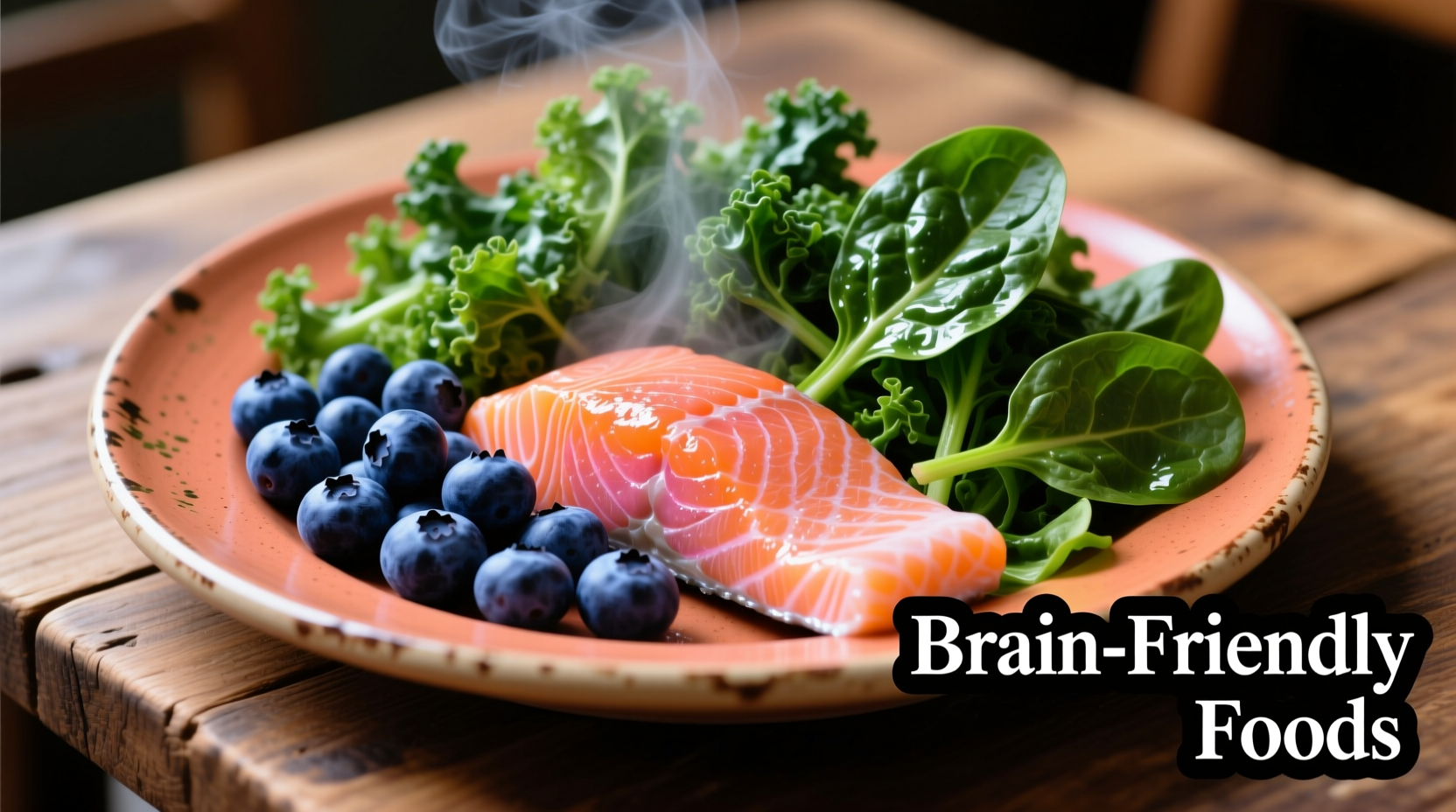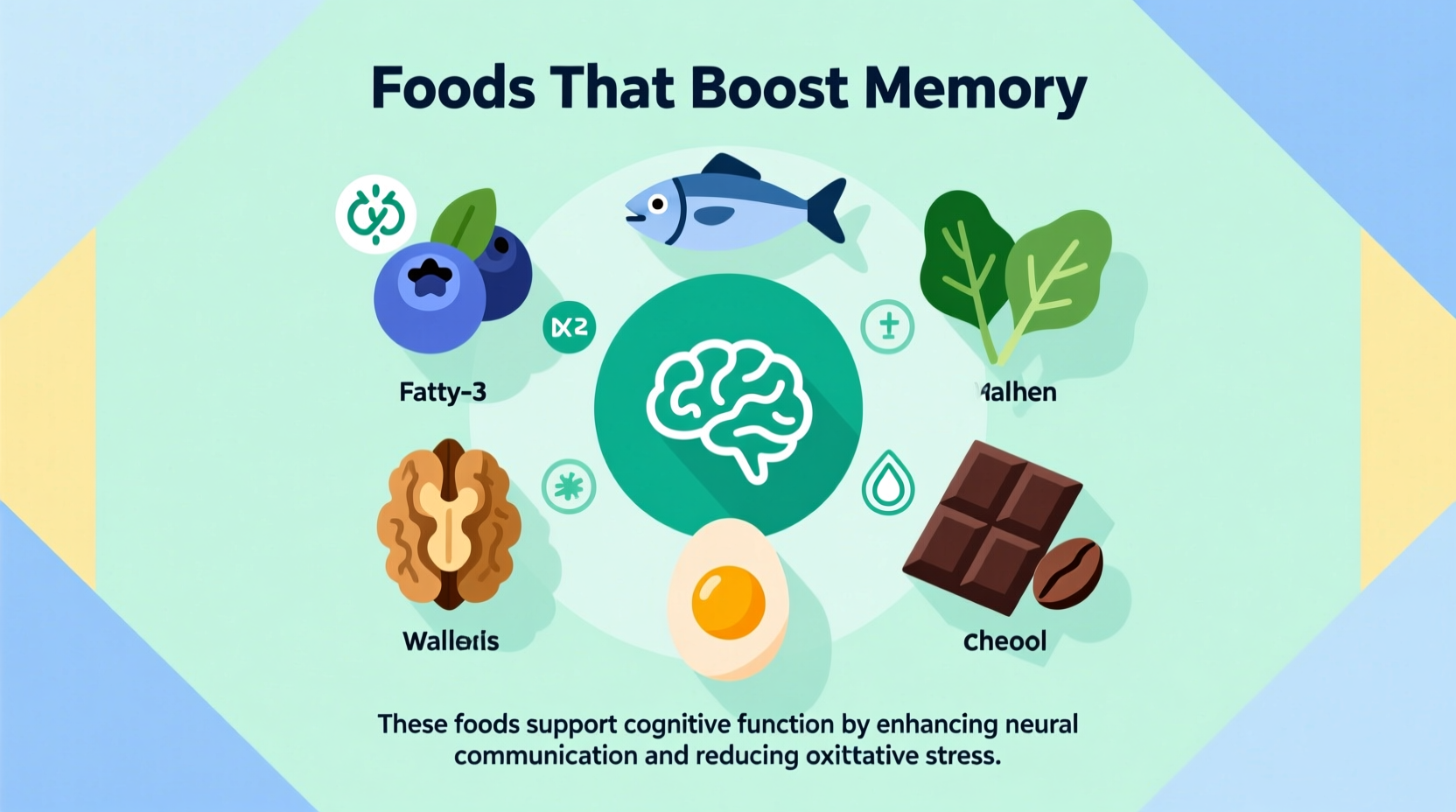Blueberries, fatty fish (like salmon), walnuts, leafy greens, and turmeric are scientifically proven foods that support memory function. These nutrient-rich options contain antioxidants, omega-3 fatty acids, and other compounds that protect brain cells, reduce inflammation, and enhance neural communication—providing both immediate cognitive benefits and long-term protection against age-related memory decline.
When you're searching for "what foods help with memory," you're likely looking for practical, science-backed solutions you can implement today—not just theoretical information. Whether you're a student preparing for exams, a professional wanting sharper focus, or someone concerned about long-term brain health, the right dietary choices can significantly impact your cognitive performance. This guide delivers exactly what you need: clear, actionable information about memory-boosting foods, explained through the lens of current nutritional science.
Why Food Matters for Your Memory: The Science Simplified
Your brain consumes about 20% of your body's energy despite representing only 2% of your weight. This energy-intensive organ requires specific nutrients to maintain neural pathways, protect against oxidative stress, and support the formation of new memories. Research published in Frontiers in Aging Neuroscience confirms that dietary patterns directly influence cognitive aging trajectories—meaning what you eat today affects your memory tomorrow.
Unlike quick-fix supplements, whole foods provide complex nutrient combinations that work synergistically. The Mediterranean diet, rich in many of the foods we'll discuss, has been associated with a 23% lower risk of cognitive impairment according to a 2018 study in Frontiers in Nutrition. Let's explore the specific foods that deliver these benefits.
Top 5 Memory-Boosting Foods and How They Work
1. Berries: Nature's Brain Antioxidants
Blueberries consistently top memory food lists due to their high anthocyanin content. These pigments cross the blood-brain barrier and accumulate in the hippocampus—the brain's memory center. A University of Cincinnati study found that older adults consuming blueberry powder daily showed significant improvements in word list recall compared to placebo.
Practical application: Add 1 cup of fresh or frozen blueberries to your morning smoothie or oatmeal. Wild blueberries contain up to 30% more anthocyanins than cultivated varieties.
2. Fatty Fish: Omega-3 Powerhouses
Fatty fish like salmon, mackerel, and sardines provide docosahexaenoic acid (DHA), a structural component of brain cell membranes. Research from the National Institute on Aging shows that higher blood levels of DHA correlate with larger brain volume and better performance on memory tests.
Practical application: Aim for two 3.5-ounce servings of fatty fish weekly. For vegetarians, algae-based DHA supplements provide a plant-derived alternative with comparable bioavailability.

3. Walnuts: The Original Brain Food
Walnuts earn their place through remarkable nutritional symmetry with brain structure and function. Their omega-3 ALA content, polyphenols, and vitamin E work together to reduce oxidative stress. A 2021 study in Nutrients demonstrated that daily walnut consumption improved inferential reasoning in healthy adults—a cognitive skill closely tied to memory formation.
Practical application: A quarter-cup (about 14 halves) provides optimal benefits. Pair with berries for enhanced antioxidant effects—this combination mimics the Mediterranean diet pattern associated with cognitive preservation.
4. Leafy Greens: The Forgotten Memory Builders
Spinach, kale, and Swiss chard deliver lutein, folate, and vitamin K—nutrients that protect against cognitive decline. Research from Rush University's Memory and Aging Project found that people consuming 1-2 daily servings of leafy greens had the cognitive equivalent of being 11 years younger than those eating none.
| Leafy Green | Key Memory Nutrients | Daily Target |
|---|---|---|
| Spinach | Vitamin K (121% DV), Folate (41% DV) | 1 cup cooked |
| Kale | Lutein (22.2mg), Vitamin K (684% DV) | 2 cups raw |
| Swiss Chard | Magnesium (38% DV), Vitamin K (332% DV) | 1 cup cooked |
5. Turmeric: The Golden Memory Enhancer
Curcumin, turmeric's active compound, crosses the blood-brain barrier and reduces amyloid plaques associated with memory decline. A UCLA clinical trial showed that 90mg of curcumin twice daily improved memory and attention in non-demented adults over 18 months. The key to absorption? Pair with black pepper (piperine increases bioavailability by 2,000%).
Practical application: Add 1 teaspoon turmeric plus a pinch of black pepper to soups, stews, or golden milk. For therapeutic effects, look for supplements containing 95% curcuminoids with piperine.
When Food Alone Isn't Enough: Important Context
While these foods significantly support memory function, they work within a broader context of brain health. Research from the National Institute on Aging shows that nutrition interacts with other factors:
- Timing matters: Memory benefits accumulate over months, not days—consistent consumption yields results
- Synergy is key: These foods work best as part of a balanced diet, not in isolation
- Individual variation: Genetic factors like APOE4 status affect how individuals respond to dietary interventions
- Limitations: Food cannot reverse established dementia, though it may slow progression
Consider these memory foods as foundational support—not standalone solutions. Pair them with quality sleep, stress management, and mental exercise for optimal cognitive preservation.
Building Your Memory-Boosting Meal Plan
Implementing these foods doesn't require drastic diet changes. Start with these simple, sustainable additions:
- Breakfast: Oatmeal with blueberries, walnuts, and a sprinkle of cinnamon
- Lunch: Spinach salad with salmon, avocado, and olive oil dressing
- Dinner: Turmeric-spiced lentil soup with kale and whole grains
- Snack: Handful of walnuts with dark chocolate (70%+ cocoa)
Consistency beats intensity—adding just one memory-boosting food daily creates meaningful long-term benefits. Track your cognitive changes in a journal; many people notice improved word recall and mental clarity within 8-12 weeks of consistent dietary changes.











 浙公网安备
33010002000092号
浙公网安备
33010002000092号 浙B2-20120091-4
浙B2-20120091-4